Behavioural Biases' Influence on Investment Decisions in the UK Market
VerifiedAdded on 2023/06/08
|6
|1471
|319
Essay
AI Summary
This essay investigates the impact of behavioral biases on investment decisions within the UK equity market, focusing on the case of Marks and Spencer. It begins by defining behavioral biases such as optimism bias, anchoring bias, loss aversion, herd mentality, recency bias, and choices paralysis, explaining how each can affect investment choices. The essay then provides context on the UK equity market, highlighting the role of the London Stock Exchange. Finally, it aims to analyse the economic factors and the impact of the stock market on UK in relation to behavioural finance of Marks and Spencer. Desklib offers a variety of study tools and solved assignments for students seeking further assistance.
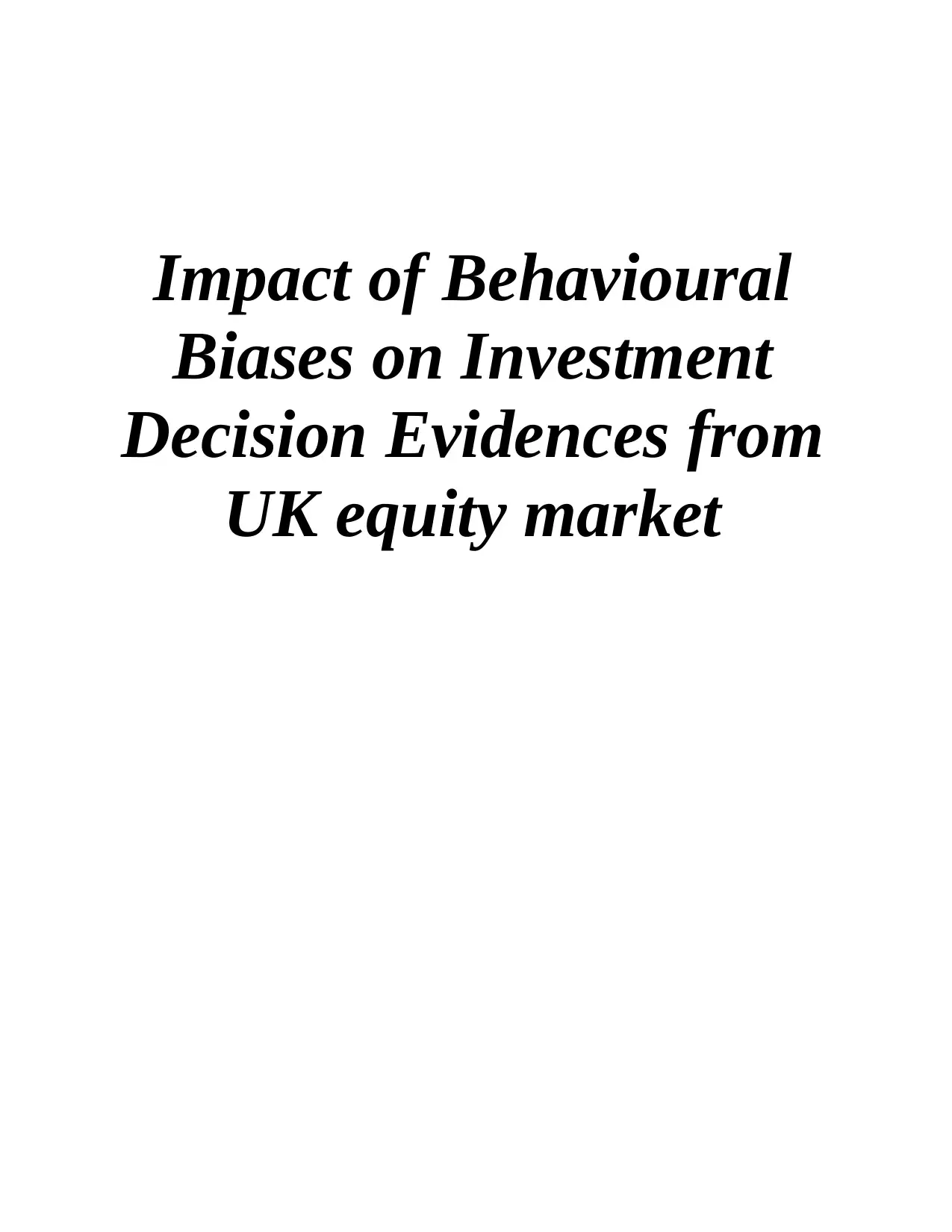
Impact of Behavioural
Biases on Investment
Decision Evidences from
UK equity market
Biases on Investment
Decision Evidences from
UK equity market
Paraphrase This Document
Need a fresh take? Get an instant paraphrase of this document with our AI Paraphraser
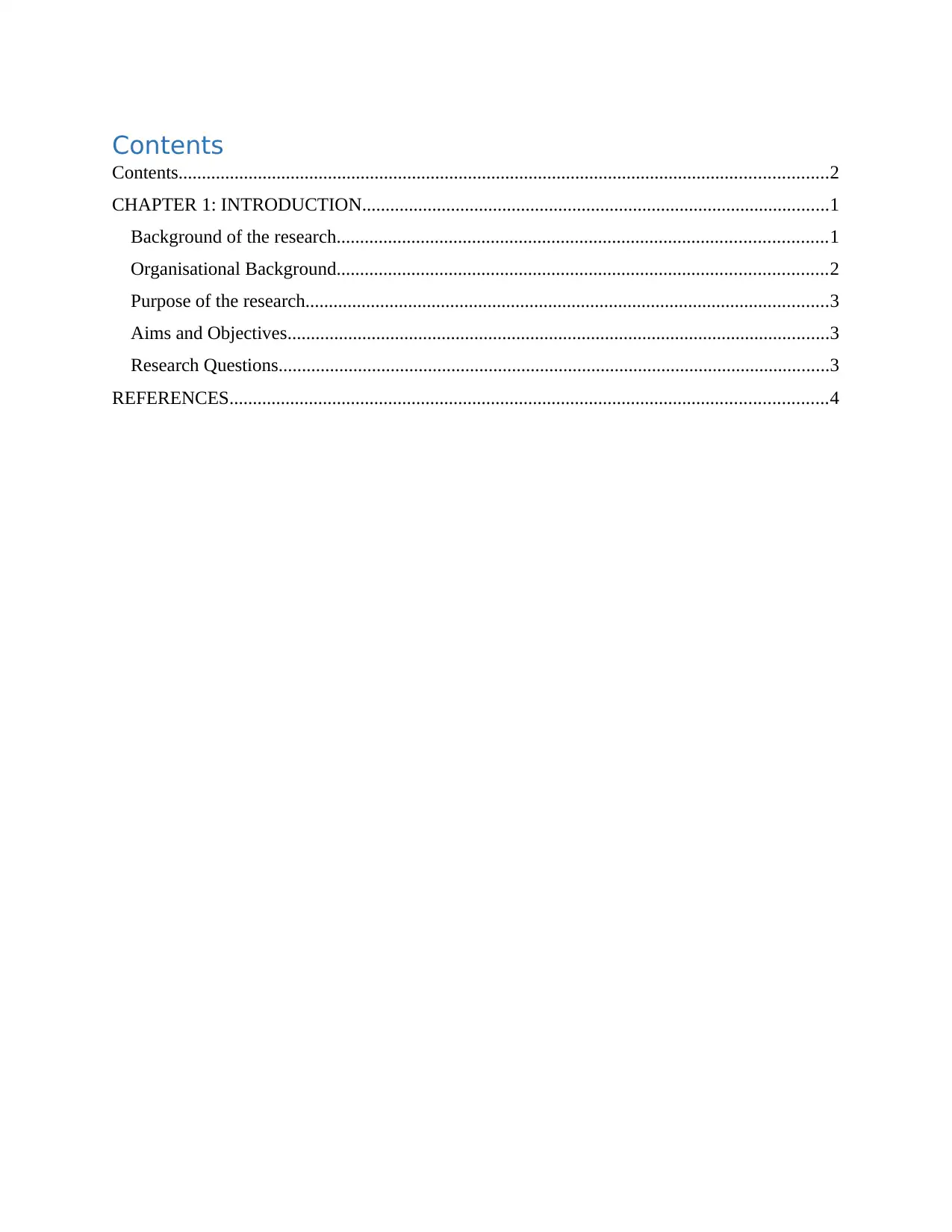
Contents
Contents...........................................................................................................................................2
CHAPTER 1: INTRODUCTION....................................................................................................1
Background of the research.........................................................................................................1
Organisational Background.........................................................................................................2
Purpose of the research................................................................................................................3
Aims and Objectives....................................................................................................................3
Research Questions......................................................................................................................3
REFERENCES................................................................................................................................4
Contents...........................................................................................................................................2
CHAPTER 1: INTRODUCTION....................................................................................................1
Background of the research.........................................................................................................1
Organisational Background.........................................................................................................2
Purpose of the research................................................................................................................3
Aims and Objectives....................................................................................................................3
Research Questions......................................................................................................................3
REFERENCES................................................................................................................................4
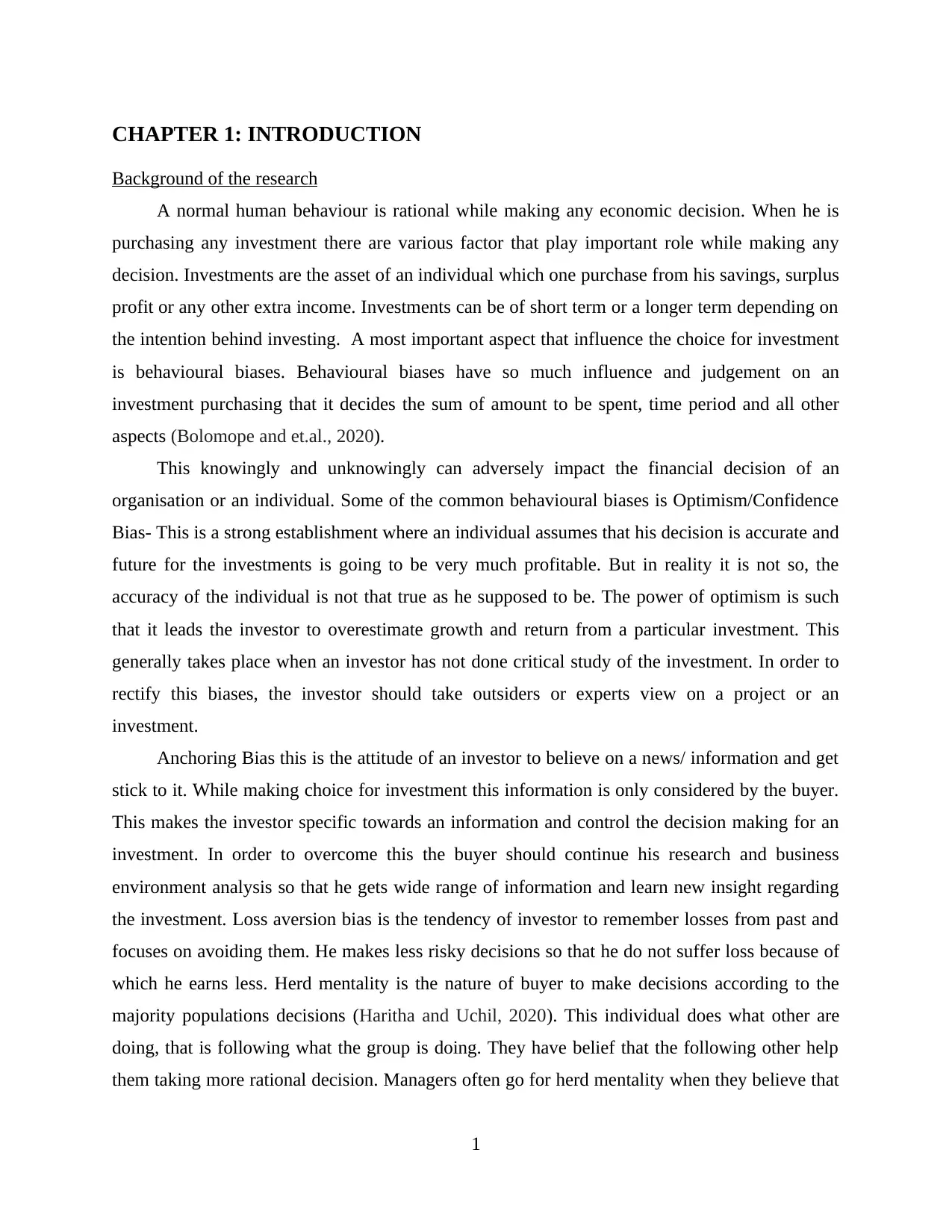
CHAPTER 1: INTRODUCTION
Background of the research
A normal human behaviour is rational while making any economic decision. When he is
purchasing any investment there are various factor that play important role while making any
decision. Investments are the asset of an individual which one purchase from his savings, surplus
profit or any other extra income. Investments can be of short term or a longer term depending on
the intention behind investing. A most important aspect that influence the choice for investment
is behavioural biases. Behavioural biases have so much influence and judgement on an
investment purchasing that it decides the sum of amount to be spent, time period and all other
aspects (Bolomope and et.al., 2020).
This knowingly and unknowingly can adversely impact the financial decision of an
organisation or an individual. Some of the common behavioural biases is Optimism/Confidence
Bias- This is a strong establishment where an individual assumes that his decision is accurate and
future for the investments is going to be very much profitable. But in reality it is not so, the
accuracy of the individual is not that true as he supposed to be. The power of optimism is such
that it leads the investor to overestimate growth and return from a particular investment. This
generally takes place when an investor has not done critical study of the investment. In order to
rectify this biases, the investor should take outsiders or experts view on a project or an
investment.
Anchoring Bias this is the attitude of an investor to believe on a news/ information and get
stick to it. While making choice for investment this information is only considered by the buyer.
This makes the investor specific towards an information and control the decision making for an
investment. In order to overcome this the buyer should continue his research and business
environment analysis so that he gets wide range of information and learn new insight regarding
the investment. Loss aversion bias is the tendency of investor to remember losses from past and
focuses on avoiding them. He makes less risky decisions so that he do not suffer loss because of
which he earns less. Herd mentality is the nature of buyer to make decisions according to the
majority populations decisions (Haritha and Uchil, 2020). This individual does what other are
doing, that is following what the group is doing. They have belief that the following other help
them taking more rational decision. Managers often go for herd mentality when they believe that
1
Background of the research
A normal human behaviour is rational while making any economic decision. When he is
purchasing any investment there are various factor that play important role while making any
decision. Investments are the asset of an individual which one purchase from his savings, surplus
profit or any other extra income. Investments can be of short term or a longer term depending on
the intention behind investing. A most important aspect that influence the choice for investment
is behavioural biases. Behavioural biases have so much influence and judgement on an
investment purchasing that it decides the sum of amount to be spent, time period and all other
aspects (Bolomope and et.al., 2020).
This knowingly and unknowingly can adversely impact the financial decision of an
organisation or an individual. Some of the common behavioural biases is Optimism/Confidence
Bias- This is a strong establishment where an individual assumes that his decision is accurate and
future for the investments is going to be very much profitable. But in reality it is not so, the
accuracy of the individual is not that true as he supposed to be. The power of optimism is such
that it leads the investor to overestimate growth and return from a particular investment. This
generally takes place when an investor has not done critical study of the investment. In order to
rectify this biases, the investor should take outsiders or experts view on a project or an
investment.
Anchoring Bias this is the attitude of an investor to believe on a news/ information and get
stick to it. While making choice for investment this information is only considered by the buyer.
This makes the investor specific towards an information and control the decision making for an
investment. In order to overcome this the buyer should continue his research and business
environment analysis so that he gets wide range of information and learn new insight regarding
the investment. Loss aversion bias is the tendency of investor to remember losses from past and
focuses on avoiding them. He makes less risky decisions so that he do not suffer loss because of
which he earns less. Herd mentality is the nature of buyer to make decisions according to the
majority populations decisions (Haritha and Uchil, 2020). This individual does what other are
doing, that is following what the group is doing. They have belief that the following other help
them taking more rational decision. Managers often go for herd mentality when they believe that
1
⊘ This is a preview!⊘
Do you want full access?
Subscribe today to unlock all pages.

Trusted by 1+ million students worldwide
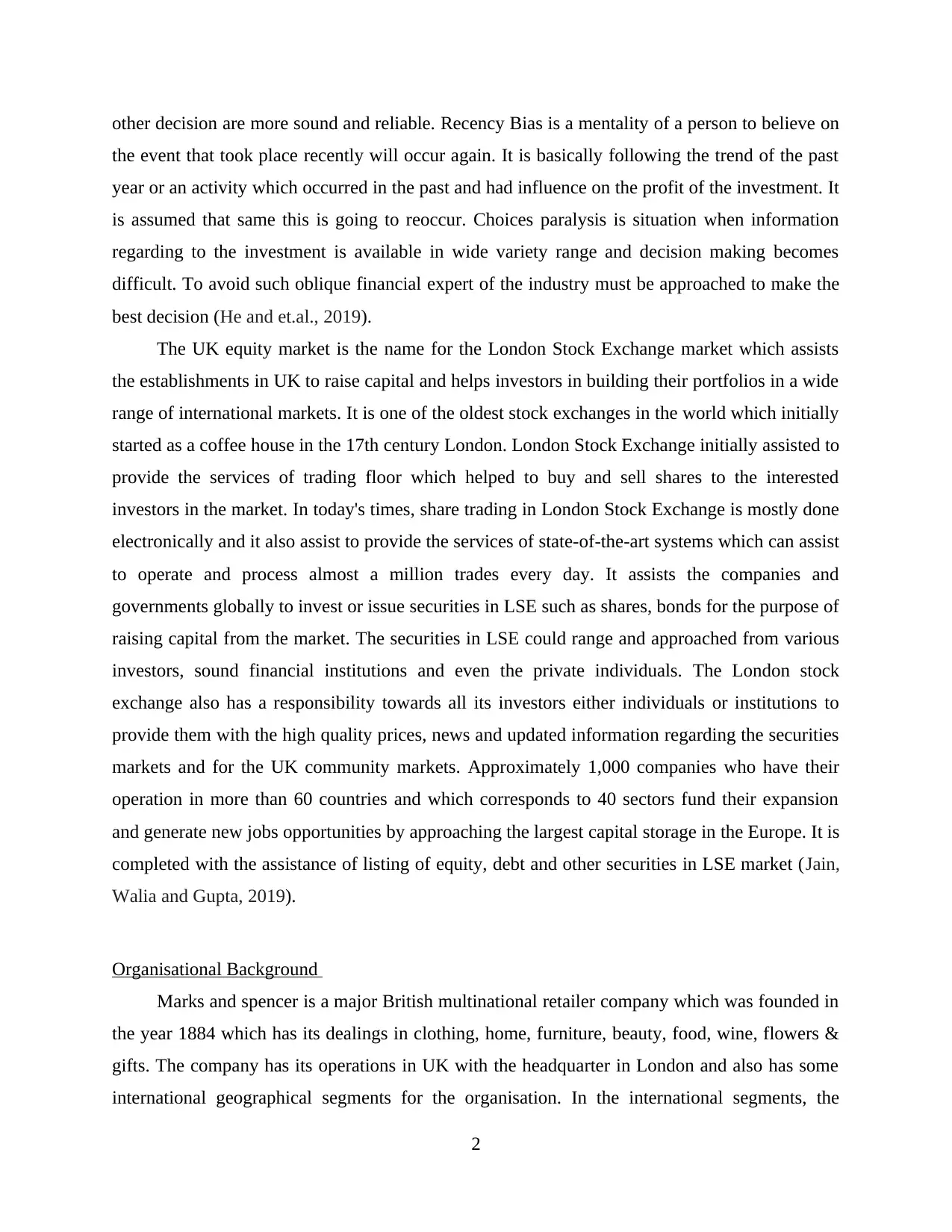
other decision are more sound and reliable. Recency Bias is a mentality of a person to believe on
the event that took place recently will occur again. It is basically following the trend of the past
year or an activity which occurred in the past and had influence on the profit of the investment. It
is assumed that same this is going to reoccur. Choices paralysis is situation when information
regarding to the investment is available in wide variety range and decision making becomes
difficult. To avoid such oblique financial expert of the industry must be approached to make the
best decision (He and et.al., 2019).
The UK equity market is the name for the London Stock Exchange market which assists
the establishments in UK to raise capital and helps investors in building their portfolios in a wide
range of international markets. It is one of the oldest stock exchanges in the world which initially
started as a coffee house in the 17th century London. London Stock Exchange initially assisted to
provide the services of trading floor which helped to buy and sell shares to the interested
investors in the market. In today's times, share trading in London Stock Exchange is mostly done
electronically and it also assist to provide the services of state-of-the-art systems which can assist
to operate and process almost a million trades every day. It assists the companies and
governments globally to invest or issue securities in LSE such as shares, bonds for the purpose of
raising capital from the market. The securities in LSE could range and approached from various
investors, sound financial institutions and even the private individuals. The London stock
exchange also has a responsibility towards all its investors either individuals or institutions to
provide them with the high quality prices, news and updated information regarding the securities
markets and for the UK community markets. Approximately 1,000 companies who have their
operation in more than 60 countries and which corresponds to 40 sectors fund their expansion
and generate new jobs opportunities by approaching the largest capital storage in the Europe. It is
completed with the assistance of listing of equity, debt and other securities in LSE market (Jain,
Walia and Gupta, 2019).
Organisational Background
Marks and spencer is a major British multinational retailer company which was founded in
the year 1884 which has its dealings in clothing, home, furniture, beauty, food, wine, flowers &
gifts. The company has its operations in UK with the headquarter in London and also has some
international geographical segments for the organisation. In the international segments, the
2
the event that took place recently will occur again. It is basically following the trend of the past
year or an activity which occurred in the past and had influence on the profit of the investment. It
is assumed that same this is going to reoccur. Choices paralysis is situation when information
regarding to the investment is available in wide variety range and decision making becomes
difficult. To avoid such oblique financial expert of the industry must be approached to make the
best decision (He and et.al., 2019).
The UK equity market is the name for the London Stock Exchange market which assists
the establishments in UK to raise capital and helps investors in building their portfolios in a wide
range of international markets. It is one of the oldest stock exchanges in the world which initially
started as a coffee house in the 17th century London. London Stock Exchange initially assisted to
provide the services of trading floor which helped to buy and sell shares to the interested
investors in the market. In today's times, share trading in London Stock Exchange is mostly done
electronically and it also assist to provide the services of state-of-the-art systems which can assist
to operate and process almost a million trades every day. It assists the companies and
governments globally to invest or issue securities in LSE such as shares, bonds for the purpose of
raising capital from the market. The securities in LSE could range and approached from various
investors, sound financial institutions and even the private individuals. The London stock
exchange also has a responsibility towards all its investors either individuals or institutions to
provide them with the high quality prices, news and updated information regarding the securities
markets and for the UK community markets. Approximately 1,000 companies who have their
operation in more than 60 countries and which corresponds to 40 sectors fund their expansion
and generate new jobs opportunities by approaching the largest capital storage in the Europe. It is
completed with the assistance of listing of equity, debt and other securities in LSE market (Jain,
Walia and Gupta, 2019).
Organisational Background
Marks and spencer is a major British multinational retailer company which was founded in
the year 1884 which has its dealings in clothing, home, furniture, beauty, food, wine, flowers &
gifts. The company has its operations in UK with the headquarter in London and also has some
international geographical segments for the organisation. In the international segments, the
2
Paraphrase This Document
Need a fresh take? Get an instant paraphrase of this document with our AI Paraphraser
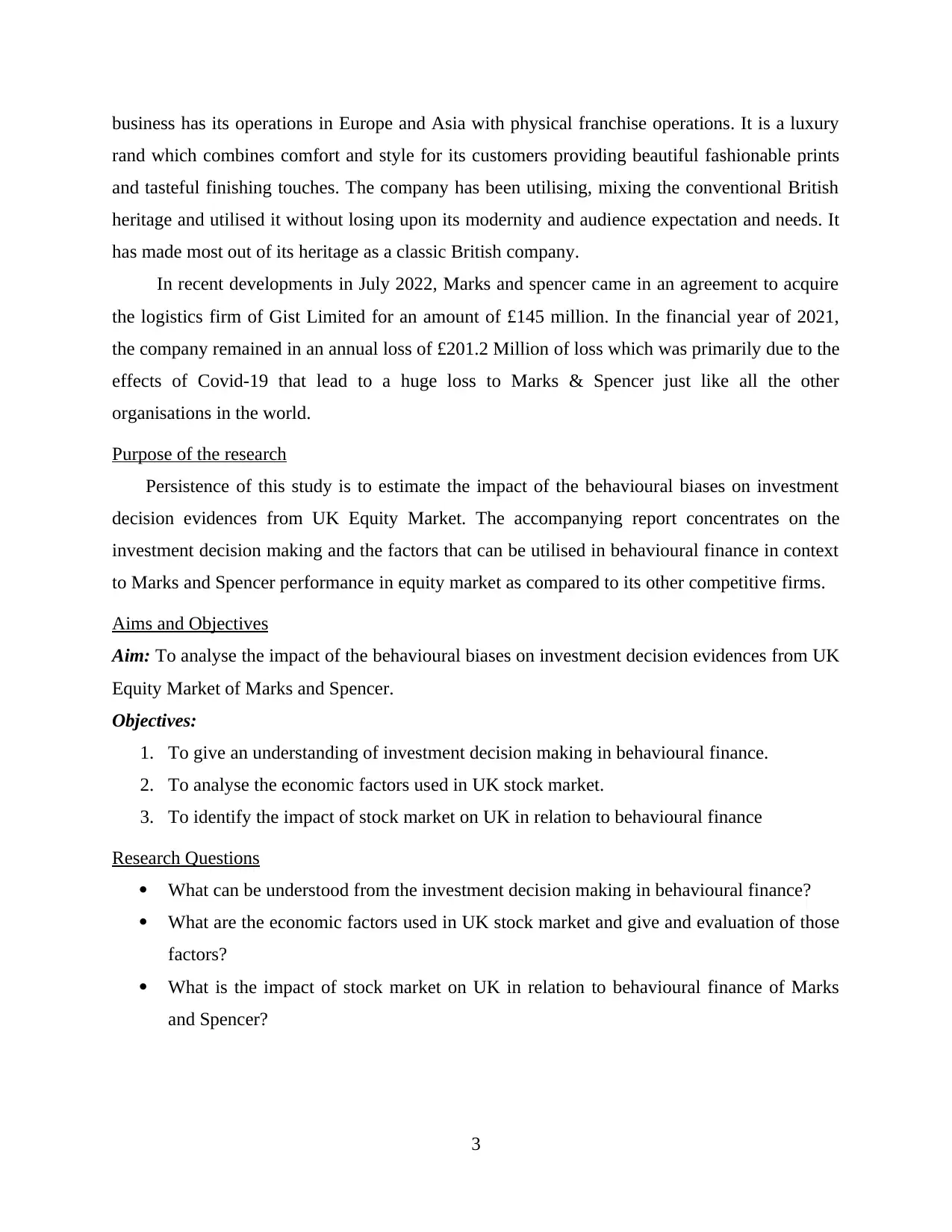
business has its operations in Europe and Asia with physical franchise operations. It is a luxury
rand which combines comfort and style for its customers providing beautiful fashionable prints
and tasteful finishing touches. The company has been utilising, mixing the conventional British
heritage and utilised it without losing upon its modernity and audience expectation and needs. It
has made most out of its heritage as a classic British company.
In recent developments in July 2022, Marks and spencer came in an agreement to acquire
the logistics firm of Gist Limited for an amount of £145 million. In the financial year of 2021,
the company remained in an annual loss of £201.2 Million of loss which was primarily due to the
effects of Covid-19 that lead to a huge loss to Marks & Spencer just like all the other
organisations in the world.
Purpose of the research
Persistence of this study is to estimate the impact of the behavioural biases on investment
decision evidences from UK Equity Market. The accompanying report concentrates on the
investment decision making and the factors that can be utilised in behavioural finance in context
to Marks and Spencer performance in equity market as compared to its other competitive firms.
Aims and Objectives
Aim: To analyse the impact of the behavioural biases on investment decision evidences from UK
Equity Market of Marks and Spencer.
Objectives:
1. To give an understanding of investment decision making in behavioural finance.
2. To analyse the economic factors used in UK stock market.
3. To identify the impact of stock market on UK in relation to behavioural finance
Research Questions
What can be understood from the investment decision making in behavioural finance?
What are the economic factors used in UK stock market and give and evaluation of those
factors?
What is the impact of stock market on UK in relation to behavioural finance of Marks
and Spencer?
3
rand which combines comfort and style for its customers providing beautiful fashionable prints
and tasteful finishing touches. The company has been utilising, mixing the conventional British
heritage and utilised it without losing upon its modernity and audience expectation and needs. It
has made most out of its heritage as a classic British company.
In recent developments in July 2022, Marks and spencer came in an agreement to acquire
the logistics firm of Gist Limited for an amount of £145 million. In the financial year of 2021,
the company remained in an annual loss of £201.2 Million of loss which was primarily due to the
effects of Covid-19 that lead to a huge loss to Marks & Spencer just like all the other
organisations in the world.
Purpose of the research
Persistence of this study is to estimate the impact of the behavioural biases on investment
decision evidences from UK Equity Market. The accompanying report concentrates on the
investment decision making and the factors that can be utilised in behavioural finance in context
to Marks and Spencer performance in equity market as compared to its other competitive firms.
Aims and Objectives
Aim: To analyse the impact of the behavioural biases on investment decision evidences from UK
Equity Market of Marks and Spencer.
Objectives:
1. To give an understanding of investment decision making in behavioural finance.
2. To analyse the economic factors used in UK stock market.
3. To identify the impact of stock market on UK in relation to behavioural finance
Research Questions
What can be understood from the investment decision making in behavioural finance?
What are the economic factors used in UK stock market and give and evaluation of those
factors?
What is the impact of stock market on UK in relation to behavioural finance of Marks
and Spencer?
3
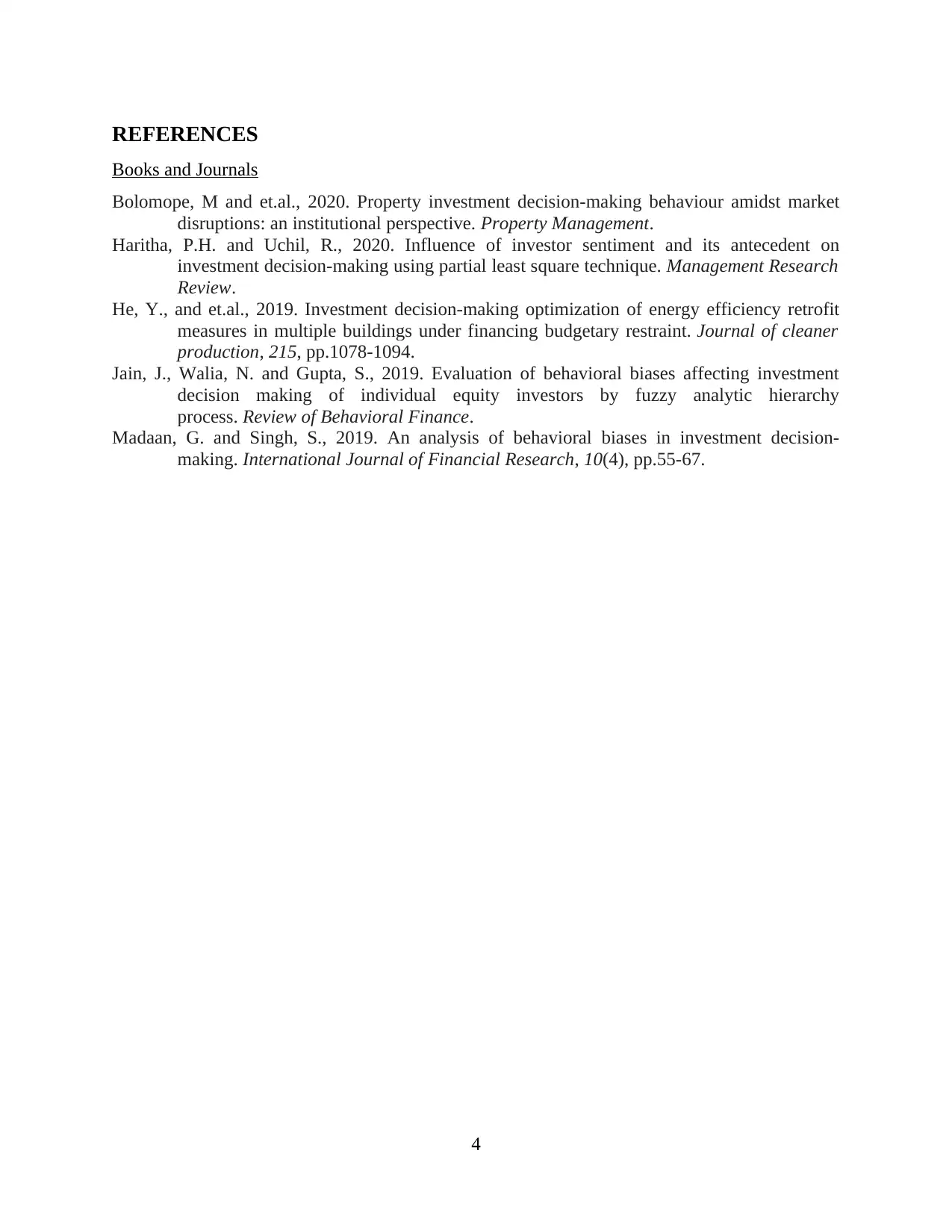
REFERENCES
Books and Journals
Bolomope, M and et.al., 2020. Property investment decision-making behaviour amidst market
disruptions: an institutional perspective. Property Management.
Haritha, P.H. and Uchil, R., 2020. Influence of investor sentiment and its antecedent on
investment decision-making using partial least square technique. Management Research
Review.
He, Y., and et.al., 2019. Investment decision-making optimization of energy efficiency retrofit
measures in multiple buildings under financing budgetary restraint. Journal of cleaner
production, 215, pp.1078-1094.
Jain, J., Walia, N. and Gupta, S., 2019. Evaluation of behavioral biases affecting investment
decision making of individual equity investors by fuzzy analytic hierarchy
process. Review of Behavioral Finance.
Madaan, G. and Singh, S., 2019. An analysis of behavioral biases in investment decision-
making. International Journal of Financial Research, 10(4), pp.55-67.
4
Books and Journals
Bolomope, M and et.al., 2020. Property investment decision-making behaviour amidst market
disruptions: an institutional perspective. Property Management.
Haritha, P.H. and Uchil, R., 2020. Influence of investor sentiment and its antecedent on
investment decision-making using partial least square technique. Management Research
Review.
He, Y., and et.al., 2019. Investment decision-making optimization of energy efficiency retrofit
measures in multiple buildings under financing budgetary restraint. Journal of cleaner
production, 215, pp.1078-1094.
Jain, J., Walia, N. and Gupta, S., 2019. Evaluation of behavioral biases affecting investment
decision making of individual equity investors by fuzzy analytic hierarchy
process. Review of Behavioral Finance.
Madaan, G. and Singh, S., 2019. An analysis of behavioral biases in investment decision-
making. International Journal of Financial Research, 10(4), pp.55-67.
4
⊘ This is a preview!⊘
Do you want full access?
Subscribe today to unlock all pages.

Trusted by 1+ million students worldwide
1 out of 6
Related Documents
Your All-in-One AI-Powered Toolkit for Academic Success.
+13062052269
info@desklib.com
Available 24*7 on WhatsApp / Email
![[object Object]](/_next/static/media/star-bottom.7253800d.svg)
Unlock your academic potential
Copyright © 2020–2025 A2Z Services. All Rights Reserved. Developed and managed by ZUCOL.





